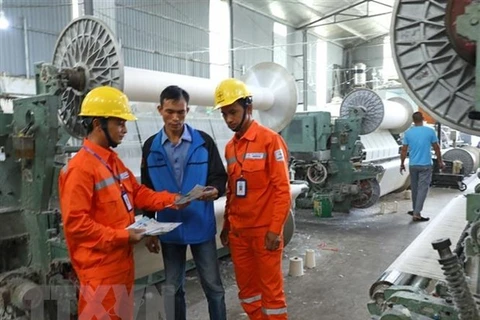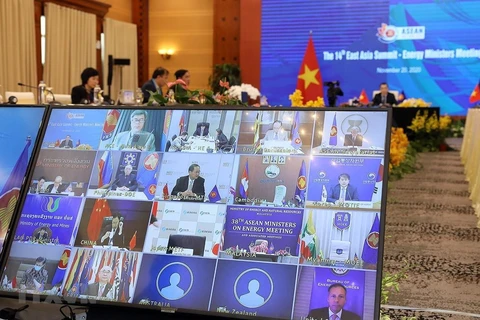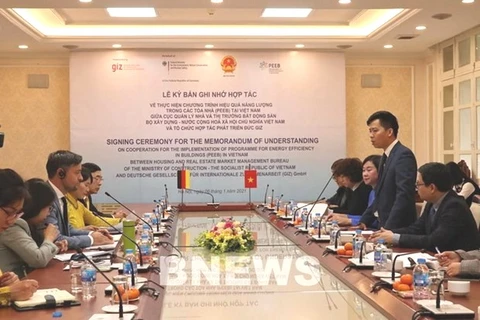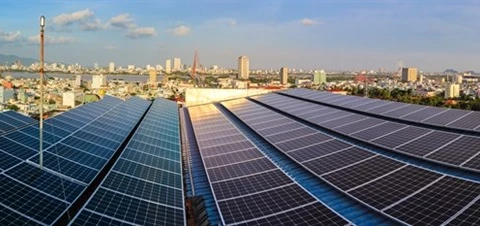Hanoi (VNA) – The Vietnam Energy Efficiency Building Week VEEBW 2021 (VEEBW 2021) hosted by the Vietnam Energy Efficiency Network (EEN-Vietnam) opened in Hanoi on November 3.
The programme was initiated by EEN-Vietnam with special support from the Goethe-Institut and the Friedrich-Ebert-Stiftung (FES).
A series of webinars in the framework of the event are co-hosted by the World Wide Fund for Nature (WWF), International Energy Agency (IEA), the Commercial and Industrial Rooftop Solar (CIRTS) of GIZ represented by the GROHE brand.
In her opening remarks, Tran Thi Thu Phuong, Founder of EEN-Vietnam said, the highlight of VEEBW 2021 is the three webinars, which bring together organisations and experts specialising in the fields of planning, investment, design, consulting, materials and renewable energy from Vietnam and developed countries.
The three-day event aims to create a premise for orientation and strategy development for the Vietnamese construction market by updating typical models of initiatives and experiences from cities, construction projects, global leading emission balancing projects, thus identifying challenges and opportunities for Vietnam's construction market, she said.
The latest updates on innovation, new solutions, and advanced models will contribute to opening up opportunities for business communities and individuals to seek, creative advanced and feasible methods and technical solutions for the Vietnamese market, Phuong added.
According to Julia Behrens, Director of the Climate & Energy Asia Project, in response to the challenge of climate change, energy balance buildings become one of the comprehensive solutions to both reduce emissions of greenhouse gas emissions in the field of construction and ensure comfort and improve the quality of living environment.
Thanks to multi-stakeholder collaborative efforts in applying renewable energy, advanced material technologies and smart products, energy-balance buildings have begun to appear in big cities around the world.
According to a report by the IEA, cities account for 66 percent of global energy demand and are responsible for 75 percent of CO2 emissions each year. Therefore, energy balance buildings will be an important agent to solve challenges of economic development and environmental protection.
Behrens underlined the need for Vietnam to learn experience and enhance cooperation with developing countries and pioneer businesses in developing energy-balancing works./.
The programme was initiated by EEN-Vietnam with special support from the Goethe-Institut and the Friedrich-Ebert-Stiftung (FES).
A series of webinars in the framework of the event are co-hosted by the World Wide Fund for Nature (WWF), International Energy Agency (IEA), the Commercial and Industrial Rooftop Solar (CIRTS) of GIZ represented by the GROHE brand.
In her opening remarks, Tran Thi Thu Phuong, Founder of EEN-Vietnam said, the highlight of VEEBW 2021 is the three webinars, which bring together organisations and experts specialising in the fields of planning, investment, design, consulting, materials and renewable energy from Vietnam and developed countries.
The three-day event aims to create a premise for orientation and strategy development for the Vietnamese construction market by updating typical models of initiatives and experiences from cities, construction projects, global leading emission balancing projects, thus identifying challenges and opportunities for Vietnam's construction market, she said.
The latest updates on innovation, new solutions, and advanced models will contribute to opening up opportunities for business communities and individuals to seek, creative advanced and feasible methods and technical solutions for the Vietnamese market, Phuong added.
According to Julia Behrens, Director of the Climate & Energy Asia Project, in response to the challenge of climate change, energy balance buildings become one of the comprehensive solutions to both reduce emissions of greenhouse gas emissions in the field of construction and ensure comfort and improve the quality of living environment.
Thanks to multi-stakeholder collaborative efforts in applying renewable energy, advanced material technologies and smart products, energy-balance buildings have begun to appear in big cities around the world.
According to a report by the IEA, cities account for 66 percent of global energy demand and are responsible for 75 percent of CO2 emissions each year. Therefore, energy balance buildings will be an important agent to solve challenges of economic development and environmental protection.
Behrens underlined the need for Vietnam to learn experience and enhance cooperation with developing countries and pioneer businesses in developing energy-balancing works./.
VNA

























